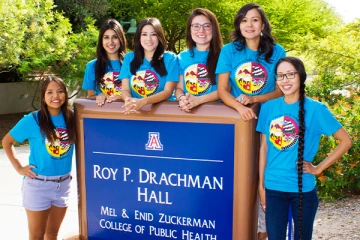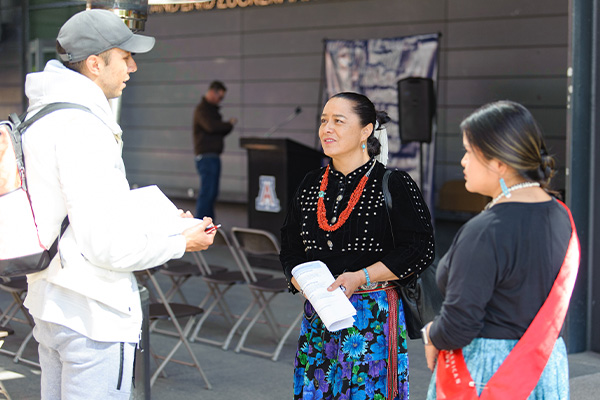Additional Giving Opportunities
Indigenous Health

The college works closely with tribal nations to serve Arizona’s large Native American population with participatory research projects and public health programs that target the many health disparities experienced by tribal communities.
Today, Arizona is home to 22 federally recognized tribes, with Tucson being home to the O’odham and the Yaqui. The Zuckerman College of Public Health has been working with Indigenous communities for many years, building sustainable relationships with sovereign Native Nations through education offerings, partnerships, and community service as we continue to grow our Indigenous faculty and program offerings.
Native Americans and Alaska Natives experience disproportionate health disparities related to chronic diseases, injury, violence, obesity and substance use. The college’s research and programs are designed to improve health outcomes in tribal communities across a range of health disparities. All our research and community projects related to Indigenous health are guided by tribal collaborators and use the community participation model. We focus on incorporating rigorous study design with culturally appropriate measures to achieve the shared goal of reducing or eliminating Native health disparities.
We need to build our public health workforce in tribal communities to address health challenges, and the college is dedicated to that mission. Your funding will help support Indigenous faculty and curriculum that will support and educate tribal students to become the public health leaders of tomorrow, skilled professionals who will guide programs, policy, and practice to create a healthier future for native nations.
Fund Raising Goals
| Priorities | Budget |
|---|---|
| Endowed Chair | $2,000,000: UA Eminent Scholar: match the payout for 5 years |
| Course Development | $100,000: Faculty support for 10 interdisciplinary courses @ $10,000 each |
| Teaching (campus & online) | $360,000 ($120K/YR for 3 years for new faculty support to teach 10 courses both on campus and online) |
| Pilot Projects | $300,000 (4 projects/year @ $25,000 each for 3 years) |
| Student Scholarships | $50,000 (2 scholarships @ $5,000 each for 5 years) |
| Communication Plan | $50,000 (Community forum, symposia, social media) |
Indigenous Health Research & Interventions
Developing culturally and contextually relevant, sustainable interventions and policies to address Indigenous health concerns.
All MEZCOPH research projects and community programs are conducted in partnership with Indigenous communities and organizations. The collaborative research and programs examine health challenges and inequities faced by these communities so we can develop culturally and contextually relevant, sustainable interventions and policies to address these needs.
From bench science to community-based research, we are creating a healthier world for all of us. Supporting research funding is vital to strengthening and sustaining public health research, providing the resources needed to advance the public health work that changes people’s lives. Your support can bridge gaps in the funding of established researchers, and help other faculty members and graduate students explore the most pressing public health challenges through innovation and collaboration.
All MEZCOPH research and community projects are guided by a tribal and community participation.
- IndigiWellbeing Program
The IndigiWellbeing program, launched by Dr. Felina Cordova-Marks, organizes culturally grounded programming for Native and Indigenous students, staff, faculty and community members to build connection and awareness among participants as a path to health and wellness.
publichealth.arizona.edu/outreach/indigiwellbeing

Aspiring Students Lead to Healthier Communities
Our Students Have Big Dreams. MEZCOPH strives to involve our Indigenous students in both research efforts and resulting publications.
Our Students Have Big Dreams. So Do We.
Everyone deserves an opportunity to earn their college degree. We are providing the opportunities and support to our Indigenous students to get them there. Scholarships help maintain the incredible diversity of our student body, which makes the classroom experience for students much richer. The College always strives to involve Native Americans and Alaska Natives students in both research efforts and resulting publications and presentations. There’s a crucial need for a diverse body of well-trained public health professionals and leaders for our state and nation. Investing in scholarships for public health students supports the greater good.
Public health continues to be an area of growth for jobs, both nationally and internationally, so we need more trained public health professionals for the workforce. However, rising tuition makes it more difficult for students to afford graduate school. We are grateful for your partnership in support of our students. Working together, we are uniting people and ideas to achieve the promise of building healthy, safe and equitable communities. Your gift will ensure that there are no barriers to the best and brightest in pursuing the public health field. It is more than a scholarship: It’s a smart investment in Arizona’s future.

Recent News

UArizona researcher at the forefront of Indigenous data sovereignty
The concept known as IDSov emphasizes Indigenous Peoples' right to control data about their people, lands and cultures. Stephanie Russo Carroll, associate director of the University of Arizona Native Nations Institute, has focused her career on encouraging institutions to adopt policies and practices that recognize that right. Carrol also teaches students, many from tribal communities, about the Indigenous data governance approach, and she is part of a team of Indigenous faculty who created a Graduate Certificate in Indigenous Health at the Zuckerman College of Public Health.

Community Comes Together to Promote Indigenous Health
At a community event to build connections for Indigenous Health, students and community members gathered to hear from Dr. Julianna Reece MPH '96, MBA, a pioneer in Indigenous Health who leads the Healthy Tribes program at the CDC, and to participate in activities, traditional food, and a round dance to build Native engagement.

